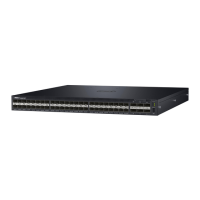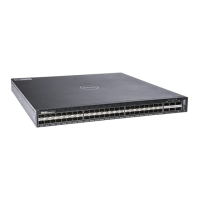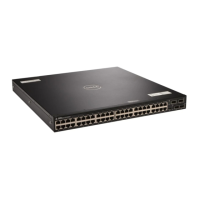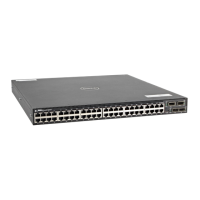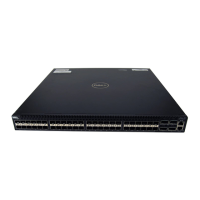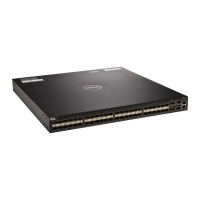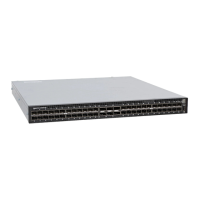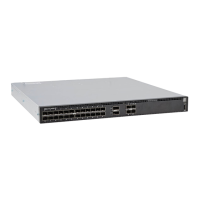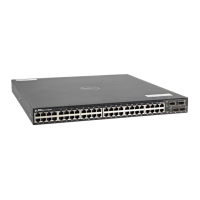Entering the physical interface type, slot, and number enables passive interface on only the identified
interface.
• For a 10-Gigabit Ethernet interface, enter the keyword TenGigabitEthernet then the slot/port[/
subport] information.
• For a 40-Gigabit Ethernet interface, enter the keyword fortyGigE then the slot/port information.
• For a VLAN interface, enter the keyword vlan then a number from 1 to 4094 (for example, passive-
interface vlan 2222 ).
The keyword default sets all interfaces on this OSPF process as passive.
To remove the passive interface from select interfaces, use the no passive-interface interface
command while passive interface default is configured.
To enable both receiving and sending routing updates, use the no passive-interface interface
command.
Example of Viewing Passive Interfaces
When you configure a passive interface, the show ip ospf process-id interface command adds the
words passive interface to indicate that the hello packets are not transmitted on that interface (shown in
bold).
Dell#show ip ospf 34 int
TenGigabitEthernet 1/1 is up, line protocol is down
Internet Address 10.1.2.100/24, Area 1.1.1.1
Process ID 34, Router ID 10.1.2.100, Network Type BROADCAST, Cost: 10
Transmit Delay is 1 sec, State DOWN, Priority 1
Designated Router (ID) 10.1.2.100, Interface address 0.0.0.0
Backup Designated Router (ID) 0.0.0.0, Interface address 0.0.0.0
Timer intervals configured, Hello 10, Dead 40, Wait 40, Retransmit 5
Hello due in 13:39:46
Neighbor Count is 0, Adjacent neighbor count is 0
TenGigabitEthernet 2/1 is up, line protocol is down
Internet Address 10.1.3.100/24, Area 2.2.2.2
Process ID 34, Router ID 10.1.2.100, Network Type BROADCAST, Cost: 10
Transmit Delay is 1 sec, State DR, Priority 1
Designated Router (ID) 10.1.2.100, Interface address 10.1.3.100
Backup Designated Router (ID) 0.0.0.0, Interface address 0.0.0.0
Timer intervals configured, Hello 10, Dead 40, Wait 40, Retransmit 5
No Hellos (Passive interface)
Neighbor Count is 0, Adjacent neighbor count is 0
Loopback 45 is up, line protocol is up
Internet Address 10.1.1.23/24, Area 2.2.2.2
Process ID 34, Router ID 10.1.2.100, Network Type LOOPBACK, Cost: 1
Enabling Fast-Convergence
The fast-convergence CLI sets the minimum origination and arrival LSA parameters to zero (0), allowing rapid
route calculation.
When you disable fast-convergence, origination and arrival LSA parameters are set to 5 seconds and 1
second, respectively.
Setting the convergence parameter (from 1 to 4) indicates the actual convergence level. Each convergence
setting adjusts the LSA parameters to zero, but the fast-convergence parameter setting allows for even
finer tuning of the convergence speed. The higher the number, the faster the convergence.
Open Shortest Path First (OSPFv2 and OSPFv3) 725
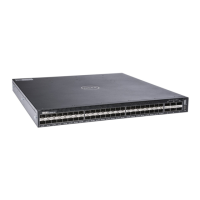
